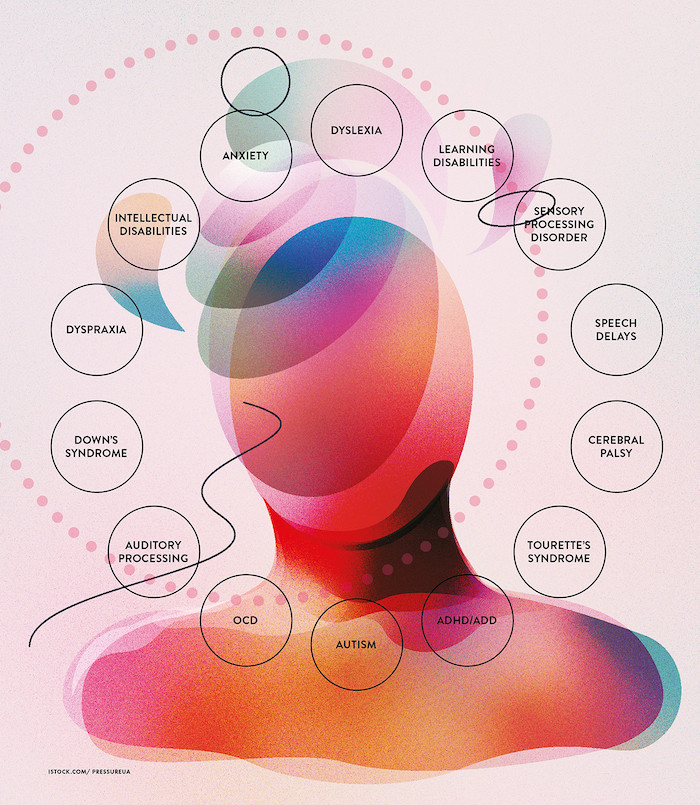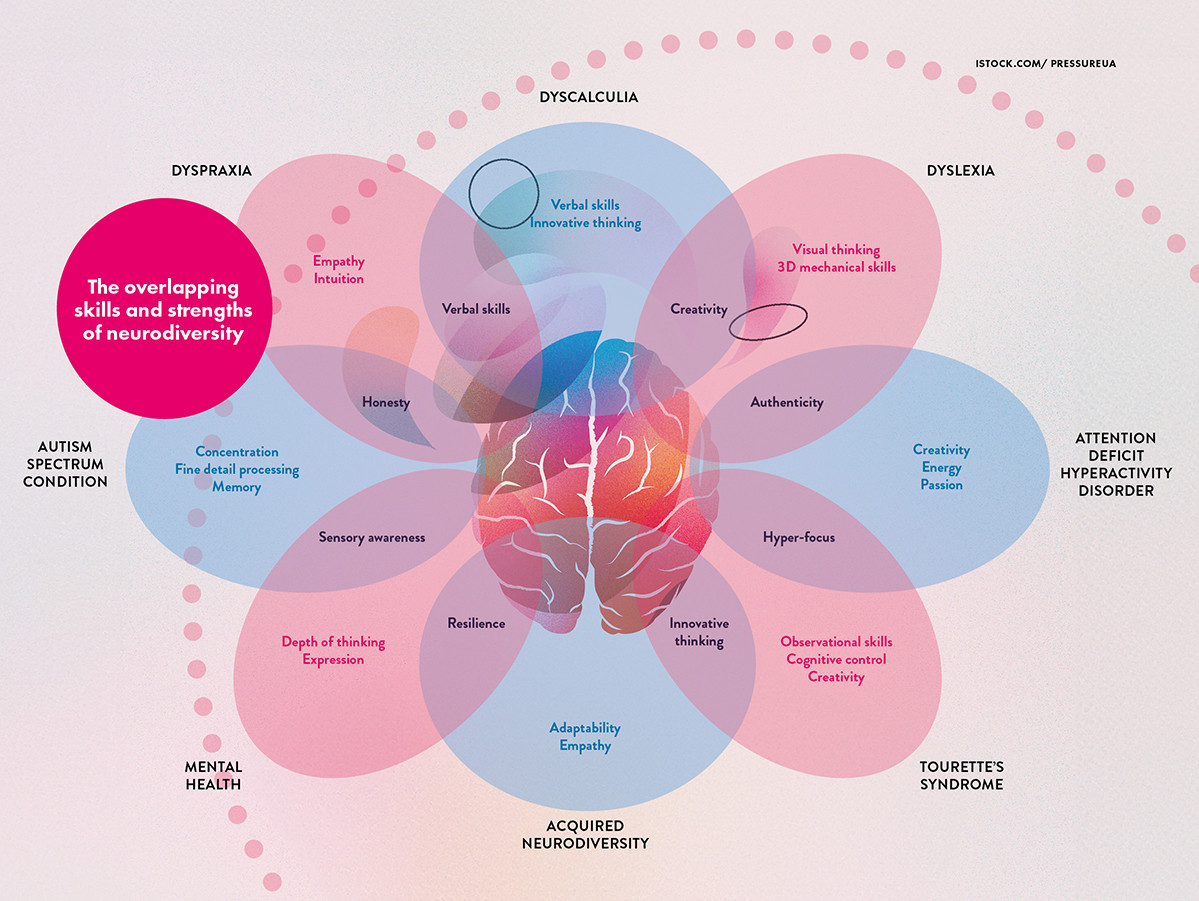
One in seven people in the UK are neurodivergent. Laura Lenox and Merly Kammerling from Well & Being talk us through how we can better support them.
Neurodiversity refers to the different ways the brain can function and process information. Being neurodivergent means having a brain that works differently from the average or “neurotypical” brain. This may be differences in ways of learning, communication methods and perception of the environment. It’s not wrong or a weakness; it simply means the neurodivergent brain processes information differently.
In the UK, it’s estimated one in seven people are neurodivergent, so it’s likely you’re working alongside or managing neurodivergent employees. Creating a work environment where people feel safe to disclose their neurodivergence should include acceptance, understanding and collaboration – and this benefits everyone. In environments that are fast-paced and ever-evolving, such as bartending, having neurodivergent team members who think differently, and challenge norms, is a strength.
Understanding neurodiversity and your employee
Neurodivergent employees thrive when they are properly supported. Too much emphasis is placed on the individual to overcome barriers society has created, and requiring those who are already structurally disadvantaged in the workplace to do their best with too little or no support is unfair and unrealistic.
It puts the onus back on the individual to succeed and becomes their fault when they don’t.
This can diminish an individual’s confidence, sense of competency and self-worth, which likely leads to frustrating and distressing experiences in the workplace and can eventually lead to (often unfair) dismissal, discrimination, or resignation. Like anyone else, neurodivergent people have unique strengths and challenges. Dr Stephen Shore says: “If you’ve met one individual with autism, you’ve met one individual with autism.” Assuming anyone who is autistic is the same as all other autistic people is an inaccurate and generalised assumption, and this goes for all neurodivergent individuals.
Many, however, experience difficulties to varying degrees with their executive functioning skills: task initiation, emotional regulation, impulse control, focus, reflection, working memory, time awareness and communication skills such as interpreting instructions and understanding social norms. These difficulties often stem from differences in brain development, the way neurotransmitters work (naturally occurring chemicals within the body which play a crucial role in regulating our behaviour and emotions. Neurotransmitters signal between brain neurons allowing our brain to communicate with the rest of our body), as well as the generalised assumption by most that we all perceive the world in the same way, which is untrue. Overcoming these internal and societal challenges, intentionally or not, takes a significant amount of time and energy from the neurodivergent individual. However, when properly supported, these difficulties can be reduced or removed, allowing neurodivergent employees to demonstrate their specialised skillsets.
It’s important to get to know your employees on an individual basis. This way, you’ll learn more about their personal strengths and challenges. When someone tells you they are neurodivergent, the only assumptions made should be that you will be curious enough to ask your employee: “What does this mean for you?” and “What support do you think you need from us?”
How to build an inclusive workplace?
Develop awareness: Team members who are aware of neurodiversity and understand how to support their neurodivergent colleagues contribute to a positive and inclusive working environment. Start your journey of understanding neurodiversity by being accepting and compassionate towards yourself, acknowledging that this will be a new and ongoing learning curve. Many neurodivergent people have two or more neurotypes and neurodivergence can manifest in infinite ways – you can’t know everything. However, you can accept everyone is different and be open to listening and learning when people reach out for support.

Review policies and processes
Workplace policies and processes should be reviewed to ensure they are inclusive and flexible enough to meet the needs of neurodivergent employees. Employers are legally bound under The Equality Act 2010 to provide reasonable adjustments to neurodivergent employees. You should have clear processes on how these adjustments can be requested and managed. Reasonable adjustments can vary for each person, depending on their support needs, and can include (but are not limited to):
• Provision of noise-reducing ear plugs or noise-cancelling headphones. These can help reduce sensory overwhelm and distractions.
• Shorter, more frequent breaks and a designated quiet area for breaks. These can help manage sensory overwhelm, energy levels and maintain focus.
• Designated and/or adjusted workstations. These can support individuals who have difficulties with transitions and changes in routine.
• Assigned buddies. Buddies can provide guidance around communication difficulties, social interaction, changes in the workplace and promote allyship.
• Accessible recruitment processes. These can reduce anxiety and allow candidates to showcase themselves and their skills. Examples include being clear about salary and expectations, conducting interviews in different formats or settings, providing questions in advance and allowing breaks during the interview. Recruitment agencies that support neurodivergent candidates often assist employers in making hiring practices more accessible.
Communicate with clarity
Neurodivergent individuals may face unique challenges due to differences in cognitive and sensory processing. For example, some might find it difficult to interpret ambiguous language, implied meanings, and social cues which can lead to misunderstandings or discomfort in social interactions. Others may struggle to maintain attention during conversation, filter out background noise or organise their thoughts coherently. Additionally, some may require written communications to be clear, not open to interpretation, simple in presentation or given in another format if they have difficulty reading.
The benefits to your business of embracing neurodivergence in the workplace: Neurodivergent individuals often bring unique perspectives and skillsets but, more broadly, a neurodiverse team will see issues from multiple perspectives, leading to more diverse discussion, creativity, analysis, and problem solving, which ultimately contributes to better team dynamics and decision making. Being regarded as an inclusive employer enhances brand reputation, not just with potential candidates, but also with clients and within your industry. Companies that openly support neurodiversity attract a wider range of applicants, giving them access to a broader and more diverse talent pool. It positions the company as a forward-thinking, socially responsible entity.
» Laura Lenox, Well & Being’s neurodiversity ambassador and a trustee of ADHD Adult UK, is autistic and ADHD (AuDHD). Laura is ex-hospo and spends her professional and personal time educating others on best practices for supporting neurodivergent individuals in the workplace and beyond.
» Laura and Well & Being founder Merly Kammerling deliver Neurodiversity in the Workplace training specifically for the hospitality industry. To find out more go to wellandbeing.co.uk


